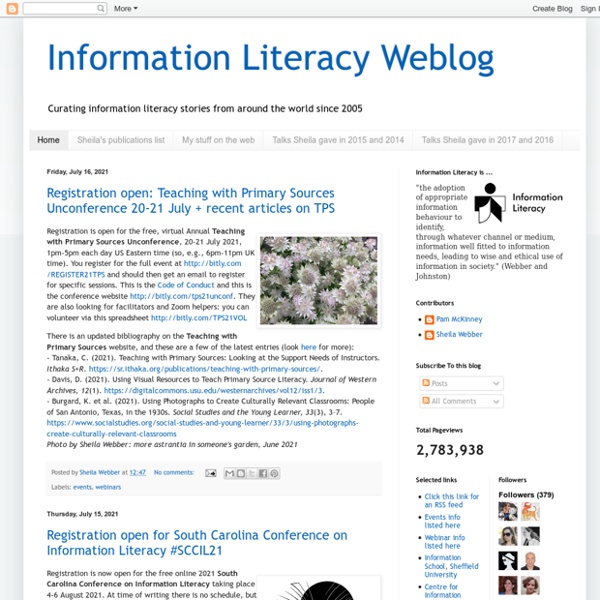Encouraging the ‘why’ behind information literacy skills: a student perspective – Information Literacy Spaces
I recently read this article by Barbara Fister, and it was as if something jumped off the page at me. I recommend you read it as there’s a tonne of really valuable insight in there about the intricate web of information overload that we’re in in this ‘post-truth’ era. Here are a few key passages that particularly resonated with me as a budding psychologist and information literacy enthusiast. First,
9891
NSF grants provide funds based on merit, not on need. A good proposal begins with a clear idea of the goals and objectives of the project—for example, creating a course or curriculum, improving a laboratory by teaching new concepts directly, teaching new material to undergraduate faculty, or preparing future technicians or K-12 teachers in a more effective way. In addition, a good project begins with a sense of why it will be a significant improvement over current practice. Envision what improvements your project will make, and then ask yourself what activities and course(s) must be developed, what instruments will be needed, or what coalitions must be formed to make the desired improvements. Focusing first on the goals and objectives helps ensure that the activities are designed to reach those goals.
Library of Congress Blog
This post is based on an article from the November–December 2016 issue of LCM, the Library of Congress Magazine. Carleton Watkins captured this view of Yosemite’s Mirror Lake while most of the country was engaged in the Civil War. National parks are among the nation’s most cherished natural resources. The National Park Service, a bureau of the U.S. Department of Interior, was created by an act of Congress.
News and media teaching ideas for secondary teachers, students and families
All links and information in this article are current as of 16 April 2020 How a newspaper is created Find out about how the Guardian newspaper is produced from start to finish: From first word to final edition is an article explaining all the processes. The nightly miracle is a short film about how the paper is printed and distributed around the country.
Why all children must learn code
Across the world, the conversion of information into a digital format – also called “digitalisation” – has increased productivity in the public and private sectors. As a result, virtually every country in the world is working towards a digital economy. As this new economy evolves, special skills like computer programming are needed.
ABLE
ABLE has been providing library basics for library staff world-wide since 1998. Over 5,000 ABLE Course Completion Certificates have been printed and distributed to individuals in 32 countries.A recent user commented:Thank you for such generosity in sharing your knowledge.....I work as a library aide in two schools in Brisbane, Australia. Your courses will be invaluable to me and many others....A big thank you to all the people at the Idaho Commission for Libraries whose thoughtfulness, knowledge and hard work has contributed to this venture. All the best, Helen Abbott, Teacher Aide, Brisbane, Australia No registration is required, simply click on the links below and begin learning.NOTE: If you recently tried the courses and they didn't work -- try again. First clear the cache on your web browser and then open the files.
About
The Intellogist blog is produced by a team of patent information professionals who work for Landon IP and have years of prior art searching experience. We’ve tried many patent search systems and tools, and we’ve got opinions about all of them! Here on our blog, we provide all the latest news from the Intellogist site, as well as our thoughts on developments of interest to the patent searching community. You can also find us on Twitter as @Intellogist.
Wikipedia:Wikipedia is not a reliable source
Wikipedia is not a reliable source. Wikipedia can be edited by anyone at any time. This means that any information it contains at any particular time could be vandalism, a work in progress, or just plain wrong.
4 Ways Technology Can Make You Happier
Source: Pixabay These days, you can’t go anywhere without hearing about how technology is ruining everything, including our happiness. There is some truth to this, but it’s not the whole story. Technology can be bad for us—for example, when social media gives us FOMO (fear of missing out) or traps us in filter bubbles that prevent us from seeing multiple points of view on important issues. As a society, we are increasingly concerned that technologies like smartphones and social media result in more social comparison, cyberbullying, and loneliness—all stumbling blocks to happiness. indeed, technology seems to be bad for our happiness when it interferes with the mental, social, emotional, and behavioral processes that contribute to well-being.
Born to Learn
Well, that’s what I’ve been told – mostly, I’m chasing down every minute of the day just to complete stuff: work, get to work, drive home, spend quality time with my family, go to the gym, work some more, watch one or five of the 18 TV shows I DVR, sleep when I can… repeat. And if anything varies outside that routine, it better be interesting, or frankly, I forget I’m even doing it. Sometimes, I have a small break where I go to the store in the middle of the day for something specific and there’s loads of people just leisurely strolling around, simply window shopping, and I think – what I wouldn’t give to have that kind of time. But the truth is, we all have the same 24 hours in a day. So why bring this up?




This blog compiles information about upcoming conferences related to contemporary issues in IL. by jb16g Mar 1